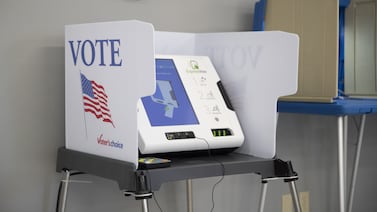Votebeat is a nonprofit news organization reporting on voting access and election administration across the U.S. Sign up for our free newsletters here.
When Michiganders go to the polls this month to cast a ballot in the presidential primaries, it will be the first chance for every voter to take advantage of the state’s new early in-person option — one feature in a series of changes for elections this year based on the passage of Ballot Proposal 2 in 2022.
The Feb. 27 primary ballot features presidential candidates for the Democratic and Republican parties, including frontrunners President Joe Biden and Donald Trump, but also several Republican candidates who are no longer running. Some jurisdictions will also have local ballot questions up for a vote. Primaries for other offices, including for Congress and U.S. Senate, will be held Aug. 6.
Who can vote and how to register in Michigan
U.S. citizens who have lived in Michigan for at least 30 days and are at least 17.5 years old can register to vote for this election, but residents must be 18 years old by Election Day.* Those currently serving a jail or prison sentence cannot register or vote.
Since 2019, Michigan automatically registers to vote anyone who is eligible and of age when they obtain a state identification card or driver’s license. One can also register to vote online at Michigan.gov/Vote, in person at a local clerk’s office, or with organizations that register voters.
If you’re not sure whether your voter registration is up to date, you can check your status at the state’s voter information center.
Michigan eliminated in-person registration deadlines and implemented same-day registration starting in 2020, meaning residents can register and vote on Election Day through 8 p.m. However, if you are registering online, then you must complete your registration by Feb. 12 or have a mailed application postmarked by Feb. 12 — at least 15 days ahead of Election Day.
All Michiganders can vote in the election regardless of their party affiliation, but they may only vote in one party’s primary. In other words, a voter may not cast votes for both a Democratic and a Republican candidate. One could vote in the Republican presidential primary election in February, and later vote in the Democratic primary in August, or vice versa.
How to vote early with an absentee ballot
Michigan voters can request an absentee ballot, then choose one of several options for returning it.
Registered voters can obtain an absentee ballot by applying online at Michigan.gov/Vote. Ballots can be requested until 5 p.m. on the Friday before Election Day — in this case, Feb. 23 — but the secretary of state recommends applying at least 15 days prior to allow time for delivery. Absentee ballots are also available at local clerks’ offices through 4 p.m. on the day prior to the election, Feb. 26, or can be requested via mail.
The state also now offers voters the choice to be placed on a permanent absentee ballot list. The local clerk will mail voters on the list an absentee ballot for every local, state, and federal election. To sign up the next time you apply for an absentee ballot, check the box next to “automatically send me an absent voter ballot for each future election for which I’m eligible.”
Absentee ballots must be filled out correctly or they will not be counted. The absentee ballot package voters receive will contain a ballot, a secrecy sleeve, a return envelope, and ballot-marking instructions.
- Be sure to sign and date the return envelope where prompted.
- Ensure your signature matches the signature on your state identification.
- Insert the ballot into the secrecy sleeve as instructed.
Once you have filled out an absentee ballot, it can be returned one of several ways. State law now requires all municipalities to offer secure drop boxes where one can drop their ballot. For locations, check with your local clerk’s office, or type in your address here.
Absentee ballots can also be dropped off at a local clerk’s office, or mailed to it with the provided pre-paid envelope, another new statewide feature under law this year. The secretary of state recommends hand-delivering an absentee ballot to the local clerk’s office or a dropbox if it is within 14 days of an election. Besides the voter, only a family member or a member of the same household can legally drop off someone else’s ballot.
No matter how they are returned, absentee ballots must be received by the local clerk by 8 p.m. on Election Day to count.
For members of the military stationed or overseas voters*, mail-in ballots must be received by the local clerk where the voter is registered up to six days after Election Day, or March 4.
Early in-person voting
This year’s new option to vote at early polling places differs from previous in-person absentee voting in that it allows the voter to fill out their ballot and insert it into a tabulator to see that it has been counted, just as they would on Election Day.
The state requires communities to offer early in-person voting for a minimum of nine consecutive days, but communities can offer it for up to 29 days. The mandatory period for in-person voting for this election begins on Feb. 17 and ends on Feb. 25.
Where communities provide early polling places will differ from place to place, because of flexibility written into the new law. Some townships and municipalities might be teaming up to offer a centralized polling place in a neighboring jurisdiction. In other cases, the county might run the early polling places and locate them across a number of key municipalities. You can type in your address at this link to find your nearest early vote location.
How to track your absentee ballot
Once you have returned your absentee ballot, you can check its status by tracking it here.
If you cast an absentee ballot and it was submitted incorrectly or is invalidated, you will likely need to go to your local clerk’s office and pick up a new one and fill it out correctly.
How to vote in person on Election Day
Polling places are open on Election Day from 7 a.m. to 8 p.m., but, if there is a line, you can still vote later as long as you were already in line by 8 p.m. Find your polling place by typing in your address at the state polling place locator.
Bring a photo identification card to the polls if you have one. That can include federal, state, or local government-issued cards like a passport, military identification card, student identification card, tribal identification card, or a concealed pistol license.
If you do not have one of the above, you will be asked to sign an affidavit confirming your identity before casting your ballot.
Check your voter registration status at the state’s voter information center.
If your name does not appear on the check-in list at your polling place, you will be issued a provisional ballot. Once a provisional ballot is cast, a voter has six days to provide appropriate identification to their local clerk. Once election officials can verify that a voter is correctly registered, the provisional ballot will be counted.
If you don’t want to cast a provisional ballot, you can ensure you are correctly registered by going to your local clerk’s office, where you can take advantage of same-day registration and then cast an absentee ballot there if needed.
If you applied for an absentee ballot but decided to vote in person anyway, bring that unused ballot to the polling place to be surrendered so you’re clear to cast a new ballot.
Open carry of firearms is prohibited in common polling places, like schools or places of worship, unless the owner of the building gives permission, or “the person possesses a valid, concealed pistol license, and no other building policy prohibits firearms possession by a concealed pistol license holder.” Exceptions to the rules include security guards, or current or former law enforcement officers.
The secretary of state recommends individuals witnessing or experiencing voter intimidation report it to an election worker or their local clerk. One can also contact the voter protection hotline at:
- English: 866-OUR-VOTE / (866) 687-8683
- Spanish: 888-VE-Y-VOTA / (888) 839-8682
- Arabic: 844-YALLA-US / (844) 925-5287
- Bengali, Cantonese, Hindi, Korean, Mandarin, Tagalog, Urdu, and Vietnamese: 888-API-VOTE / (888) 274-8683
How to get assistance with voting
Voters in the city of Fennville, Clyde Township, and Covert Township have a right to a ballot in Spanish, while Hamtramck voters can obtain a ballot in Bengali, under the U.S. Voting Rights Act.* Voters in Dearborn and Hamtramck can also request ballots in Arabic.
Voters with disabilities that make it difficult to fill out a ballot may apply for a ballot that can be completed electronically, printed, and returned to the local clerk. You can apply for one here.
Voters who are blind, disabled, unable to read, unable to write, or cannot read English can bring anyone they choose to assist with voting except their employer, an agent of their employer, or a union representative.
Michigan has an ombudsperson for Accessible Elections to help people with disabilities who are attempting to vote. The ombudsman can be reached at 517-335-2730 or email MDOS-ADAVoting@michigan.gov.
Voters with hearing impairments should contact the Bureau of Elections by email at elections@michigan.gov.
If you run into any problems, we want to hear about them!
If you have any other questions or concerns about voting in Michigan, please let us know! We can be reached at community@votebeat.org.
Corrections, Feb 26: This article has been updated to clarify when 17-year-olds can cast a ballot before Election Day; to clarify how all members of the military or overseas voters can return an absentee ballot; and to correct the list of communities where voters can request ballots in Spanish.






